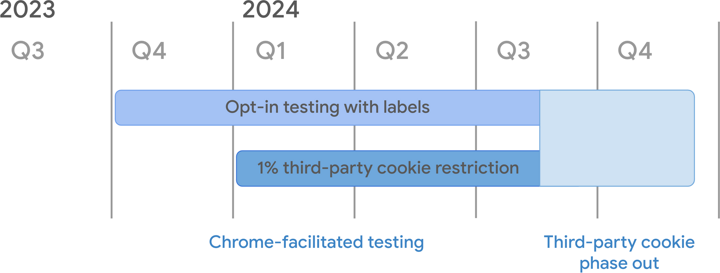For years, third-party cookies have been the backbone of online advertising, allowing advertisers to track user behaviour across the web and deliver targeted ads.
However, with growing concerns about user privacy, these cookies are facing their demise.
This blog post will provide an understanding of third-party cookie deprecation and its implications for advertisers, website owners, and users alike.
Understanding Third-Party Cookies
Imagine you visit a website that sells sports equipment.
They might place a small file, called a cookie, on your browser. This cookie stores information about your visit, like the items you viewed.
Now, if you head to a news website later, that same equipment store might be able to show you ads based on your previous browsing history.
This is the power of third-party cookies – they track your activity across different websites, allowing advertisers to build detailed profiles of your interests and target you with relevant ads.
Video Transcript
[Tim Lillyman]
I guess the first question really in your own words, what is cookie deprecation actually mean?
[Ash Rane]
Yeah, cool. So, so cookie deprecation actually refers to the phasing out of specifically third party cookies. So in order to really understand that, we need to understand more what is cookie. So effectively a cookie is a small piece of data stored on the user’s device, which is set by the websites as they browse different websites.
[Tim Lillyman]
Right.
[Ash Rane]
There are mainly two types of cookies. There’s the first party cookie and third party cookie. So first party cookies, they’re the ones that are set by the website itself, the domain itself that you’re on. Third party cookies are set by external demands on on the user’s websites that they’re browsing. Now, these are used for various different purposes. They’re for tracking purposes that for analysis and then other various methods. But the main reason why third party cookies are being phased out is because there has been a rise in concerns on data privacy as well as security and how these websites handle and use that information that are being stored.
We’ve already seen that major brands such as Google Chrome, Mozilla, Firefox, Apple Safari, as well as Microsoft Edge, have taken steps to either limit or completely eliminate the usage and storage of those third party cookies.
And so what website owners, advertisers they really need to understand the need to move to is what are some of those alternative solutions to to not relying on third party cookies. Some alternate solutions include moving to a first party cookie strategy.
Other methods includes using the privacy, preserving methodologies such as the federated Learning of Cohorts, the LLC, or even moving back to contextual based advertising. So basically, advertisements on the websites and the content in the website the user is currently.
The Deprecation of Third-Party Cookies
Concerns about user privacy have led to a movement away from third-party cookies.
Users are increasingly wary of being tracked across the web, and regulations like GDPR (General Data Protection Regulation) are forcing companies to be more transparent and accountable for how they collect and use user data.
As a result, major browsers like Google Chrome, Firefox, and Safari are phasing out support for third-party cookies.
Google Chrome’s phase-out is currently underway, with complete removal expected by the end of 2024.

Google Chrome’s Third-Party Cookie Deprecation Timeline
This deprecation will significantly impact the way online advertising works. Advertisers will no longer be able to rely on third-party cookies to track user behaviour across different websites.
No Third-Party Cookies Means Reduced Targeting Capabilities
This is the most immediate and significant impact. Without the ability to track users across websites, building detailed individual profiles and delivering hyper-targeted ads becomes much harder. For businesses without a privacy-first strategy, this will mean:
- Less personalised, relevant ads: Users will see ads that are less aligned with their interests, potentially leading to decreased engagement and click-through rates.
- Lower conversion rates: With less targeted ads, the ability to convert interest into sales or desired actions could diminish.
Cookie deprecation presents a significant challenge, but it also creates an opportunity to explore alternative solutions that prioritise user privacy.
The Future of Online Advertising Without Third-Party Cookies
So, what does the future hold for online advertising? Several solutions are emerging to address the challenges of a cookieless world:
- First-party data: Companies can leverage the data they collect directly from their users, such as email addresses and website interactions, to personalise advertising and build stronger relationships with their audience.
- Contextual targeting: This approach focuses on the content of a website or app to deliver relevant ads. For example, an ad for running shoes might appear on a website about fitness, regardless of the user’s individual browsing history.
- Privacy-preserving technologies: These technologies aim to provide effective advertising while protecting user privacy. Examples include contextual targeting solutions that anonymise user data and collaboration between platforms to prevent individual user tracking.
Building trust and transparency with users will be paramount in the cookieless future. Users must be informed about how their data is collected and used, and they must have control over their privacy settings. Only then can a sustainable and privacy-focused advertising ecosystem thrive.
Preparing for a cookieless world is challenging
The deprecation of third-party cookies marks a significant shift in the online advertising landscape. While it presents challenges, it also opens doors for innovative and user-centric solutions. By embracing first-party data, contextual targeting, and privacy-preserving technologies, advertisers can continue to reach their target audience effectively while respecting user privacy.
XPON is a strategic technology partner that helps brands like yours to prepare for a cookieless world. If you have any further questions or would like help getting privacy-ready, get in touch with our team here.
